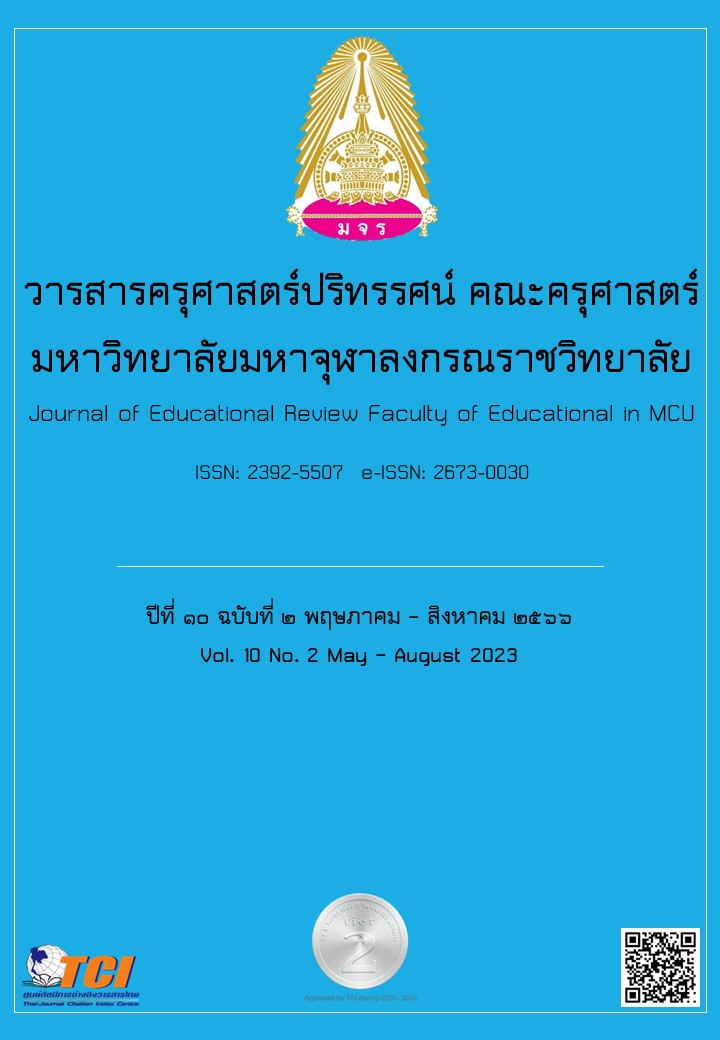A META-ETHNOGRAPHY RESEARCH ON EDUCATIONAL ADMINISTRATION FOLLOWING BUDDHIST PRINCIPLES IN SECONDARY SCHOOLS
Main Article Content
Abstract
The purposes of this thesis were 1) to analyze the characteristics of research on Educational Administration Following Buddhist Principles in Secondary Schools, 2) to synthesize the current state of knowledge, 3) to compare the similarities and differences of research results, and 4) to present the new knowledge from research. Qualitative research method using a research method of “Meta-Ethnographic research” to study 15 issues related on Educational Administration Following Buddhist Principles in Secondary Schools. The research instrument was the research quality assessment form and research data record form and focus group discussion 9 persons expert. Analyze data with content analysis and analysis of basic statistical values such as mean, standard deviation, skewness, kurtosis, maximum and minimum values. The research results showed that: 1) The characteristics of research at the doctoral dissertations. Most studied on model of Educational Administration Following Buddhist principles in secondary schools. Most of the informants were educational experts and school administrators. 2) The current state consists of 6 issues, consisting;
(1) goals of educational administration, (2) Buddhist Principles related to educational administration, (3) characteristics of educational administrators, (4) educational administration process, (5) educational administration skills, and (6) educational administration results. 3) Compare the similarities or differences of the research results in 6 issues, consisting; (1) there are two different goals of educational administration, quality of educational and quality of life, (2) there are two different purposes of Buddhist Principles, aiming for successful management and aiming to understand the truth thoroughly, (3) there are 8 characteristics, (4) there are 6 steps, (5) there are two different group of educational administration skills, skills to help at work and skills to help build good relationships in the organization, and (6) there are 6 issues of educational administration results. 4) New knowledge from research is the components of education administration following Buddhist principles in secondary schools consisted of 6 major components and 55 sub-components.
Article Details

This work is licensed under a Creative Commons Attribution-NonCommercial-NoDerivatives 4.0 International License.
ทัศนะและความคิดเห็นที่ปรากฏในบทความในวารสารฉบับนี้ถือเป็นความรับผิดชอบของผู้เขียนบทความนั้นเพียงผู้เดียว และไม่ถือเป็นทัศนะและความรับผิดชอบของกองบรรณาธิการ
กองบรรณาธิการขอสงวนสิทธิ์ในการคัดเลือกบทความลงตีพิมพ์และจะแจ้งให้เจ้าของบทความทราบหลังจากผู้ประเมินบทความตรวจอ่านบทความแล้ว
ต้นฉบับที่ได้รับการตีพิมพ์ในวารสารครุศาสตร์ปริทรรศน์ คณะครุศาสตร์ มหาวิทยาลัยมหาจุฬาลงกรณราชวิทยาลัย ถือเป็นกรรมสิทธิ์ของคณะครุศาสตร์ มหาวิทยาลัยมหาจุฬาลงกรณราชวิทยาลัย ห้ามนำข้อความทั้งหมดหรือบางส่วนไปพิมพ์ซ้ำ เว้นเสียแต่ว่าจะได้รับอนุญาตจากมหาวิทยาลัยฯ เป็นลายลักษณ์อักษร
References
กระทรวงศึกษาธิการ. (2551). หลักสูตรแกนกลางการศึกษาขั้นพื้นฐาน. กรุงเทพมหานคร: โรงพิมพ์ชุมชนสหกรณ์การเกษตรแห่งประเทศไทย.
จิตรกร จันทร์สุข และคณะ. (2564). การตัดสินใจสำหรับผู้บริหารสถานศึกษา. วารสารมนุษยศาสตร์และสังคมศาสตร์มหาวิทยาลัยราชภัฏอุดรธาน. 10 (2). 223-238.
ทวีศักดิ์ ทองทิพย์. (2554). การบริหารสถานศึกษาโดยใช้หลักไตรสิกขาของโรงเรียนวัดพระพุทธบาทเขากระโดง อำเภอเมือง จังหวัดบุรีรัมย์. ดุษฎีนิพนธ์พุทธศาสตรดุษฎีบัณฑิต. มหาวิทยาลัยมหาจุฬาลงกรณราชวิทยาลัย.
ทวีศักดิ์ สุขกมล. (2561). การใช้หลักสัปปุริสธรรมในการบริหารงานเชิงบูรณาการของผู้บริหารเทศบาลตำบลป่าไหน่ อำเภอพร้าว จังหวัดเชียงใหม่. วารสารพุทธศาสตร์ศึกษา. 9 (1). 69-81.
บุญสืบ โพธิ์ศรี และธีระวัฒน์ จันทึก. (2559). การบริหารตามหลักธรรมาภิบาลของโรงเรียนอาชีวศึกษาเพื่อมุ่งเน้นการผลิตแรงงานมืออาชีพ. Veridian E-Journal Silpakorn University. 9 (2). 216-229.
บุบผา เมฆศรีทองคำ. (2547). การวิจัยชาติพันธุ์วรรณนาอภิมานเกี่ยวกับการมีส่วนร่วมของชุมชนในการจัด การศึกษา. วิทยานิพนธ์ครุศาสตรมหาบัณฑิต. จุฬาลงกรณ์มหาวิทยาลัย.
บุบผา เมฆศรีทองคำ. (2552). การวิจัยชาติพันธุวรรณนาอภิมาน: การสังเคราะห์งานวิจัยเชิงคุณภาพ. วารสารกองการพยาบาล. 36 (2). 77-85.
พระครูโสภณธรรมประดิษฐ์ (วีระพัฒน์ จันทร์ศรีนาค). (2561). รูปแบบการบริหารการศึกษาตามพุทธวิธีของโรงเรียนพระปริยัติธรรม แผนกสามัญศึกษาจังหวัดนครศรีธรรมราช. วารสารสันติศึกษาปริทรรศน์ มจร. 6 (4). 1372-1378.
พระเทพเวที (ประยุทธ์ ปยุตฺโต). (2533). วิธีคิดตามหลักพุทธธรรม. กรุงเทพมหานคร: สหมิตร.
พระปลัดสนธิชัย ปสนฺนจิตโต (มาตรไพจิตร์). (2561). กลยุทธ์การพัฒนาภาวะผู้นำตามหลักพุทธบริหารการศึกษาสำหรับผู้บริหารสถานศึกษา สังกัดสำนักงานเขตพื้นที่การศึกษาประถมศึกษาภาคกลาง. ดุษฎีนิพนธ์พุทธศาสตรดุษฎีบัณฑิต. มหาวิทยาลัยมหาจุฬาลงกรณราชวิทยาลัย.
พระพรหมคุณาภรณ์ (ป.อ. ปยุตฺโต). (2553). ธรรมนูญชีวิต. พิมพ์ครั้งที่ 122. กรุงเทพมหานคร: โรงพิมพ์สหธรรมิก.
พระสุนทรา วรสาโร จันทร์โต. (2562). โยนิโสมนสิการของผู้บริหารโรงเรียนพระปริยัติธรรมแผนกสามัญศึกษา. ดุษฎีนิพนธ์ปรัชญาดุษฎีบัณฑิต. มหาวิทยาลัยศิลปากร.
ภารดี อนันต์นาวี. (2552). หลักการแนวคิดทฤษฎีทางการบริหารการศึกษา. กรุงเทพมหานคร: สำนักพิมพ์มนตรี.
มหาวิทยาลัยมหาจุฬาลงกรณ์ราชวิทยาลัย. (2562). หลักสูตรครุศาสตรดุษฎีบัณฑิต สาขาวิชาพุทธบริหารการศึกษา (หลักสูตรปรับปรุง พ.ศ. 2562). แหล่งที่มา https://acd.mcu.ac.th/wp-content/uploads/2021/05/มคอ.2_-ค.ด.-พุทธบริหารการศึกษา-ป-เอก-62-1.pdf. สืบค้นเมื่อ 7 มิ.ย. 2565.
สำนักงานปฏิรูปการศึกษา. (2545). แนวทางการบริหารและการจัดการศึกษาในเขตพื้นที่การศึกษาและสถานศึกษา. กรุงเทพมหานคร: พิมพ์ดี.
อัญชลี สุขวิบูลย์. (2559). ภาวะผู้นำของผู้บริหารสถานศึกษาที่ส่งผลต่อคุณภาพชีวิตในการปฏิบัติงานของครูในโรงเรียนมัธยมศึกษาในจังหวัดเพชรบุรี สังกัดสำนักงานเขตพื้นที่การศึกษามัธยมศึกษา เขต 10. Veridian E-Journal Silpakorn University. 9 (2). 1452-1466.
อุดม ชำนิ. (2558). การพัฒนาภาวะผู้นำตามแนวพุทธของผู้บริหารโรงเรียนการกุศลของวัดในพระพุทธศาสนาเขตภาคกลาง. ดุษฎีนิพนธ์พุทธศาสตร์ดุษฎีบัณฑิต. มหาวิทยาลัยมหาจุฬาลงกรณราชวิทยาลัย.
George W. Noblit and R. Dwight Hare. (1988). Meta-Ethnography: Synthesizing Qualitative Studies. Newbury Park: SAGE Publications, Inc.
Taylor, Frederick W. (1916). The Principles of Scientific Management. New York: Harper.


